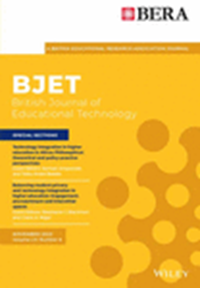The integration of digital games into teaching and learning—A unique constructivist framework
Abstract
In today's era, the ability to create and utilize digital games in the classroom is of great importance, for both teachers and students. Yet traditional teaching methods often lack the implementation of games in general, and of digital games in particular. This study presents a unique constructivist framework for creating and integrating digital-game generators in the classroom, following four consecutive year-long courses for preservice teachers at a college in Israel. Using design-based research, year-to-year improvements (iterations) to the course were introduced, achieved through analysis of in-class discussions, semi-structured interviews, participants' reflective diaries and the generated games. The participants were required to apply the constructivist framework to a study unit in their field of expertise, during their practical school-teaching experience. The findings in this study are based on the participants' teaching experience in secondary schools in three core subjects: English as a second language, mathematics and history. The developed consecutive framework comprises three core elements: the game, the pedagogical and didactic core, and the knowledge—all of which are important when integrating digital-game generators into the classroom. The course and framework addressed in this study could be applied in additional teacher-training programs, to increase digital-game generation and related skills in classrooms.
Practitioner notes
What is already known about this topic
- Creating and implementing digital games in the classroom has gained momentum in recent years.
- Early exposure of preservice teachers to digital games during the teaching training phase may increase their use in the educational field.
- The developing and integration of digital games in the classroom, based on the constructivist approach, allows students to create games using existing game generators, while expressing their insights and knowledge in a personal and creative manner.
What this paper adds
- Introduces an innovative framework integrating educational game generation into teacher training, addressing key pedagogical and content knowledge components.
- Demonstrates the successful application of this framework across multiple disciplines (English, mathematics and history) in secondary education.
- Presents a longitudinal study showcasing the iterative development and refinement of a game-based learning approach in preservice teacher education.
- Provides evidence-based insights into the effectiveness of incorporating digital game creation as a constructivist learning tool in teacher preparation programs.
Implications for practice and/or policy
- The constructivist framework helps expose preservice teachers—and in early stages of their teacher training—to experimenting with different types of digital games and different methods for integrating them into their teaching.
- Such integration of digital games into their teaching may promote meaningful learning, with an emphasis on the development of important 21st-century skills.
- In light of the proposed model, the study recommends promoting the topic of digital games in teacher training, for the benefit of the preservice teachers' future students.





 求助内容:
求助内容: 应助结果提醒方式:
应助结果提醒方式:


